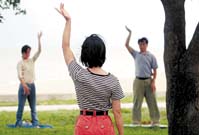July 10, 2001
ST. PETERSBURG -- The evening parade of joggers and in-line skaters creates a blur of motion, colorful dabs of paint on the green canvas of North Shore Park. In the water, dogs splash and bark. A pick-up soccer game springs to life on the grass.
Under the big oak tree by the sea wall, there's an oasis of calm. About a dozen people stand silently in a circle. They move in unison as a small boom box plays [...] music. They look like they're dancing, only in slow motion.
A red-and-blue banner strung between two palms announces the name of what these people are doing: FALUN DAFA, a spiritual practice better known as falun gong.
A man with a poodle on a leash, cell phone pressed to his ear, hurries by.
"Hold on a second," he says into the phone. He pauses. Man and dog watch curiously.
Every so often, prompted by a nasal voice speaking Chinese on the tape machine, the group holds one pose for several minutes. Sometimes they hold their arms at shoulder height, or overhead. Sometimes the hands pause in front of the stomach. They stand like trees, wind rippling their pant legs as shouts ring out from the soccer game behind them.
 Their
eyes are closed, their smiles beatific.
Their
eyes are closed, their smiles beatific.
Here in the park, they can do their slow-motion dance and the worst that will happen is someone might stare.
If this were China, most likely a police van would pull up to the curb. Officers with batons would sprint across the grass. In moments, the people doing the peaceful exercises would be handcuffed, dragged to the van and taken away.
Some would never be heard from again.
* * *
Falun gong, outlawed in China, where it originated, has found a new home in the West. Loosely organized groups have come together in most American cities, often practicing in public parks, YMCAs or on college campuses. Several groups meet in the Tampa Bay area, including two in St. Petersburg and two in Tampa.
There is never any charge, say organizers. Newcomers simply show up and learn the exercises from veterans.
St. Petersburg immigration lawyer David Lee, 39, and his wife Allison Hood, 34, host a weekday falun gong session in North Shore Park. Both are Chinese-born; Lee is a U.S. citizen. Lee said when he first heard about falun gong, he was dubious.
"My attorney's mind said this cannot work without a hierarchy, an organization. Also, how could it be worth something if it's free?"
Then he began practicing falun gong, felt more energetic and peaceful -- and his chronic migraines went away.
Falun gong adherents say it is not a religion, but rather a spiritual teaching that helps them become better people.
"The thing that I really carry with me from day to day is those three principles," said Melinda Poole of Tampa. "Truthfulness, compassion, benevolence."
Poole, 50, practices falun gong with a group in Tampa that meets every Saturday morning at Lettuce Lake Park. Sometimes her son, Collin, 12, joins them.
 "If
I go into a session feeling stressed or depressed, after I do the exercises, all
of that is gone," Poole said. "And then the rest of the day, I feel so
different."
"If
I go into a session feeling stressed or depressed, after I do the exercises, all
of that is gone," Poole said. "And then the rest of the day, I feel so
different."
Lisa Raphael, 66, a St. Petersburg author and counselor, was attracted to falun gong's "peace and calm." The movements, she said, "have their own flow."
When Raphael, a Holocaust survivor, discovered that the group's symbol is the swastika, she was horrified. She did some research and found that the swastika predates Adolf Hitler by centuries. Its original meaning is good fortune or well-being, according to falun dafa information.
* * *
For generations, Chinese people have gathered at dawn in public parks to perform the flowing movements of tai chi (tie-CHEE), their national exercise. Many also practice qigong (chee-KUNG), a similar discipline that is said to awaken and move energy (qi or chi) within the body.
Students learn the exercises from a teacher, or master. Each is a combination fitness trainer-spiritual coach, highly revered.
In 1992, a young man from Manchuria began teaching a new form of qigong with simpler movements. He called it falun gong, or falun dafa, which is loosely translated as "law wheel of the universe." It caught on quickly, spread to Beijing, and the young man, Li Hongzhi, a former government grain clerk and trumpet player in a military band, became the venerable "Master Li."
By the mid-1990s, by some estimates, falun gong had nearly 100-million adherents in China. Master Li lectured widely. Huge crowds gathered daily to perform the exercises and meditation he prescribed.
China's [party' name omitted] government grew nervous. Large gatherings could spell trouble. Any ideology other than Communism was a threat, even something as seemingly benign as falun gong's principles of truth, benevolence and compassion.
[...]
Arrests began in 1999. People were seized from their homes, taken to police stations, interrogated and told they must repudiate Master Li's teachings or be beaten.
Falun gong was declared an "[Jiang Zemin government's slanderous term omitted]." Practicing it -- even in the privacy of one's home -- was a treasonous act.
In the two years since, thousands have been arrested. Some were sentenced to labor camps without a trial. Others were confined in mental hospitals. More than 200 have died in police custody, and many beatings have been documented by Western journalists. [...]. Amnesty International and Human Rights Watch have denounced the repression; both houses of the U.S. Congress passed resolutions against it. Activists say Beijing should be denied its bid to host the 2008 Summer Olympics, which the International Olympic Committee will vote on Friday. The groups meeting in the Tampa Bay area circulate fliers about the repression in China. Master Li's books can be downloaded for free from falun dafa Web sites.
[...]
Lee's parents-in-law, also falun gong practitioners, have been living with Lee and his wife since December, when they fled China to escape the persecution.
Guifen Gao, 64, Lee's mother-in-law, was arrested in November 2000 as she rode her bicycle through the streets of Beijing, distributing falun gong fliers. Two plainclothes police officers took her by the arm and walked her to a nearby police station. She tried to struggle and shout for help, but the police officers ordered her to keep calm.
"They don't want a scene," Gao explained recently in Mandarin, as her son-in-law translated. "They don't want anyone to know they're arresting someone."
At the police station, Gao was strip-searched and interrogated. The police wanted to know where she got the falun gong material she was handing out. She wouldn't tell them anything. Other police officers went to her house to search for evidence and intimidate her husband, Jisheng Hu, 61.
Gao spent a month in jail, crowded into a small cell with 17 other prisoners. She was interrogated several times and threatened with a long prison sentence. She watched guards force saltwater into the stomachs of two other prisoners to punish them for going on hunger strike. When she got out of jail, she and her husband fled the country.
"As soon as I stepped on United States soil and could practice freely again, I got a wonderful feeling," Gao said.
Lee is working to have his in-laws' visas extended so they can remain here.
"What the Chinese government is doing is wrong," he said. "It's a violation of human rights, to deny people the right to pursue their spiritual development."
Fushuang Cui leads a small falun gong group at noon on weekdays outside a classroom building at the University of South Florida in Tampa. Cui, 27, came here in 1998 to study for a doctorate in civil engineering. He said doing falun gong in public places educates people about the repression in China.
"We want to tell others about people who are suffering for their basic human rights. We hope this will not last too long. And then we can go back."
At North Shore Park in St. Petersburg, another small group meets at 6:30 a.m. weekdays and 8 a.m. Sundays. While maintenance men prune shrubbery and empty trash cans, Sherwood Liu and his parents hang their Falun Dafa banner, plug the boom box into an electrical outlet and settle onto bath mats they've placed in the grass.
Liu, 38, is a marine science researcher at the St. Petersburg campus of USF. He and his wife, Bin Peng, 35, a finance specialist at USF, both practice falun gong. Several years ago, Liu introduced it to his parents, who were still in China and suffered from various health problems.
After they practiced falun dafa for three months, they felt much better, Liu said. No pain, more energy, a more positive outlook. But several relatives and friends who also practiced falun gong were arrested, beaten and sentenced to labor camps.
Liu sent his parents plane tickets to Florida. Here, they spend their days reading Master Li's books and practicing the exercises every morning at North Shore Park. They do not speak English.
"They really appreciate the opportunity to practice here," Liu said. "This is the best thing I could give them, as their son."
They will stay as long as their visa allows. They are afraid to return to China but dream of practicing falun gong in their own park again.
A man in running shorts, with a shaved head and biceps tattoo, stops on the sidewalk as Liu and his parents lift their arms in slow unison. Chinese music floats on the humid air.
The man kneels, takes one of Liu's flyers, reads it.
"Please Help Stop China's Persecution Against Millions of Innocent Falun Gong Practitioners."
Carefully, almost reverently, the man puts the flyer back. Liu and his parents are sitting in meditation now, their hands folded in their laps. They don't see.
For information Call toll-free 1-877-325-8699
www.falundafa.org
www.faluninfo.net
www.ctr.usf.edu/falundafa
Falun gong groups meet in the Tampa Bay area at: 6:30 a.m. weekdays and 8 a.m. Sundays -- North Shore Park at base of 12th Avenue NE, St. Petersburg. Call Sherwood Liu, (727) 323-4445.
6 p.m. weekdays -- North Shore Park at base of 15th Avenue NE, St. Petersburg. Call David Lee, (727) 579-0333.
Noon weekdays -- Lawn of engineering building on University of South Florida campus, Tampa. Call Fushuang Cui, (813) 974-5825.
Category: Falun Dafa in the Media






